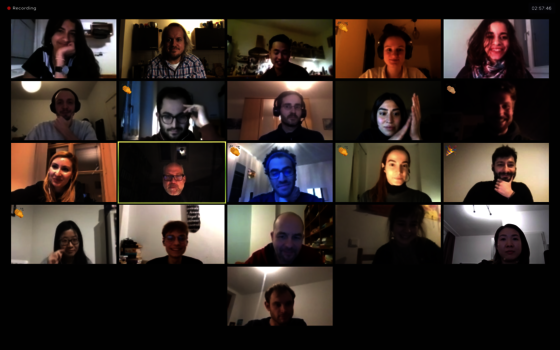Heat, drought, then again extreme precipitation - the last few years have presented Berlin with a variety of water-related challenges. At the "Berlin Water Hackathon," students and experts from various disciplines collaborated to develop creative solutions. The hackathon was organized by ECDF professors Jochen Rabe and Andrea Cominola in cooperation with ide3a and the Berlin Senate Department for Economic Affairs, Energy and Operations.
Two teams were able to convince the jury: Team 3, consisting of Philipp Grimm, Lennart Schmidt, Julian Feinauer and Sarah Eisenkolb, wants to use part of Berlin's 102,000,000 m2 of roof area to avoid sewer overflows after heavy rainfall. The idea of the expert-team: 60% of Berlin's roofs are flat and would have room for a 1000 liter rainwater tank to collect water. Depending on the weather forecast, the collected water will either be used in the household or - if there is still capacity in the sewer system - it will be fed into the system at a later date to prevent flooding.
Team 5's goal is to keep various groups updated on the status of Berlin's water system on a daily basis. The Aquapolis app will bring together government agencies, private water service companies and civil society organizations. The team, consisting of students John Tu, Wanda Krauss, Mikolaj Szwaja and Samar Adel Mohamed Mohamed Alarif, plans for the app to help with decision-making on water issues, but also to warn of polluted bathing water, for example.
Team 1 proposed to extend the already successful app Gieß den Kiez to motivate more residents to water the trees in their neighborhood. Gamification and financial incentives are the main ways to do this. Another idea for excess rainwater came from Team 4: planted roofs and permeable pavement could be supplied with excess water to prevent overflowing and at the same time reduce sealed surfaces.
At the end of the multi-day event, jury member Prof. Jochen Rabe once again emphasized the urgency of solution concepts and the quality of the ideas presented: "It is really remarkable how detailed the participants' ideas were, even though there was so little time available. I'm excited to see how the idea development continues." In the coming weeks, the student winning team will continue to work on their solution and then present a second time.

